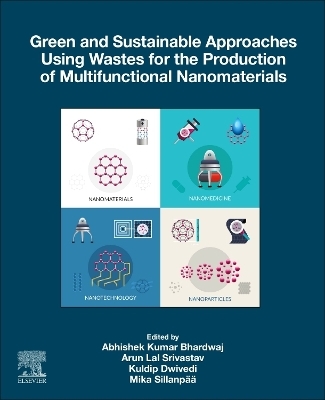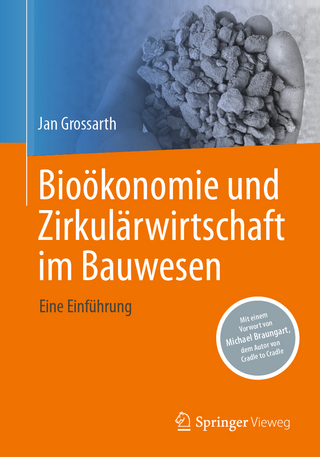
Green and Sustainable Approaches Using Wastes for the Production of Multifunctional Nanomaterials
Elsevier - Health Sciences Division (Verlag)
978-0-443-19183-1 (ISBN)
Dr. Abhishek Kumar Bhardwaj is working as an Assistant Professor at Amity School of Life Sciences, Department of Environmental Science, Amity University, India. He obtained his PhD from the Central University of Allahabad, Prayagraj, India, in the field of environmental nanotechnology. He has also done Post-doctoral research at the Department of Environmental Science, VBS Purvanchal University, Jaunpur (India). Currently, He is actively involved in the teaching and guidance of undergraduate, MSc, and PhD students. Dr. Bhardwaj's research interests encompass a wide array of topics, including green synthesis of nanomaterials for water purification, bio-sensing, nano-based device fabrication, water treatment, diatom cultivation, mushroom cultivation, phytoremediation, and waste management. His contributions to the field are well-recognized, as he has published over 30 research papers in prestigious journals, including Elsevier, Springer, American Chemical Society, American Institute of Physics, MDPI, and Frontier, among others. Furthermore, Dr. Bhardwaj serves as a respected reviewer for esteemed journals such as Journals of Cleaner Production, Journals of Environmental Pollution, Bioresource Technology, Journals of Nanoparticle Research, Scientific Reports, and more. He has also edited two books in collaboration with Elsevier and Springer. His dedication to academia and research has made him a valuable asset to the scientific community and a significant influence in the field of environmental science and nanotechnology. Dr. Kuldip Dwivedi is a professor and the head of the Department of Environmental Science at Amity University Madhya Pradesh (AUMP) in Gwalior (India). In the year 2007, he received his Ph.D. on the topic "In vitro Screening and Biochemical Studies for Salt-Tolerance in Trifolium alexandrinum." He has a total of eight years of research experience and fifteen years of teaching experience. He has successfully mentored four students through the Ph.D. process. He is currently teaching and assisting graduation,postgraduate, and Ph.D students at Amity University in Gwalior in frontier areas of Environmental Science. Phytoremediation, ecological restoration, nanomaterials for environmental cleaning, biosensors for environment and agriculture, abiotic stress biology, environmental biotechnology, agro-ecological studies of crop plants, and micropropagation of important crop plants and trees are just a few of his research interests. He has over 30 research papers published in prestigious international and national journals. He's written two books for graduate students. Mika Sillanpää’s research work centers on chemical treatment in environmental engineering and environmental monitoring and analysis. The recent research focus has been on the resource recovery from waste streams. Sillanpää received his M.Sc. (Eng.) and D.Sc. (Eng.) degrees from the Aalto University where he also completed an MBA degree in 2013. Since 2000, he has been a full professor/adjunct professor at the University of Oulu, the University of Eastern Finland, the LUT University, the University of Eastern Finland and the University of Johannesburg. Dr. Arun Lal Srivastav is working as an Associate Professor at Chitkara University, Himachal Pradesh in India. He is currently involved in the teaching of environmental science, environmental engineering, and disaster management to the undergraduate engineering students. His research interests include water treatment, river ecosystem, climate change, soil health maintenance, phytoremediation, and waste management. He has published around 91 research publication (as per SCOPUS) in various peer-reviewed, national and international journals, conferences, and books. He has also filed 25 patents on multidisciplinary topics. He is also working on four government-sponsored projects (worth ~16 million INR) on phytoremediation, adsorption, capacity building, organic farming, leachate treatment, agro-waste management, and so on.
Global status of biogenic and nonbiogenic waste production and their employability in nanomaterial production
Sustainable advances in the synthesis of waste-derived value-added metal nanoparticles and their applications
Fundamental scope of nanomaterial synthesis from wastes
Anticipated challenges in the synthesis of different nanomaterials using biogenic waste
Domestic waste utilization in the synthesis of functional nanomaterial
Panorama of microbial regimes toward nanomaterials’ synthesis
Sustainable valorization of food waste for the biogeneration of nanomaterials
Industrial wastes and their suitability for the synthesis of nanomaterials
Scope to improve the synthesis of nanomaterial’s using industrial waste
Application and characterization of nonbiogenic synthesized nanomaterials
Nanomaterial synthesis using tire and plastic
Emerging biowaste-derived surfaces to support redox-sensitive nanoparticles: applications in removal of synthetic dyes
Nanomaterials synthesis from the industrial solid wastes
Nanomaterials’ synthesis from the industrial solid wastes
Green synthesis of nanomaterials from plant resources: its properties and applications
Nanotechnology for sustainable development and future: a review
Utilization of biogenic waste as a valuable calcium resource in the hydrothermal synthesis of calcium- orthophosphate nanomaterial
A review of plant-derived metallic nanoparticles synthesized by biosynthesis: synthesis, characterization, and applications
The intra- and extracellular mechanisms of microbially synthesized nanomaterials and their purification
Fundamental scope of nanomaterial synthesis from wastes
Application of nanomaterials synthesized using agriculture waste for wastewater treatment
Nanomaterial synthesis from the plant extract and tree part
Recent advances in agriculture waste for nanomaterial production
Nanomaterials’ synthesis from the fruit wastes
| Erscheinungsdatum | 27.01.2024 |
|---|---|
| Verlagsort | Philadelphia |
| Sprache | englisch |
| Maße | 216 x 276 mm |
| Gewicht | 1020 g |
| Themenwelt | Naturwissenschaften ► Biologie ► Ökologie / Naturschutz |
| Technik ► Umwelttechnik / Biotechnologie | |
| ISBN-10 | 0-443-19183-2 / 0443191832 |
| ISBN-13 | 978-0-443-19183-1 / 9780443191831 |
| Zustand | Neuware |
| Haben Sie eine Frage zum Produkt? |
aus dem Bereich


